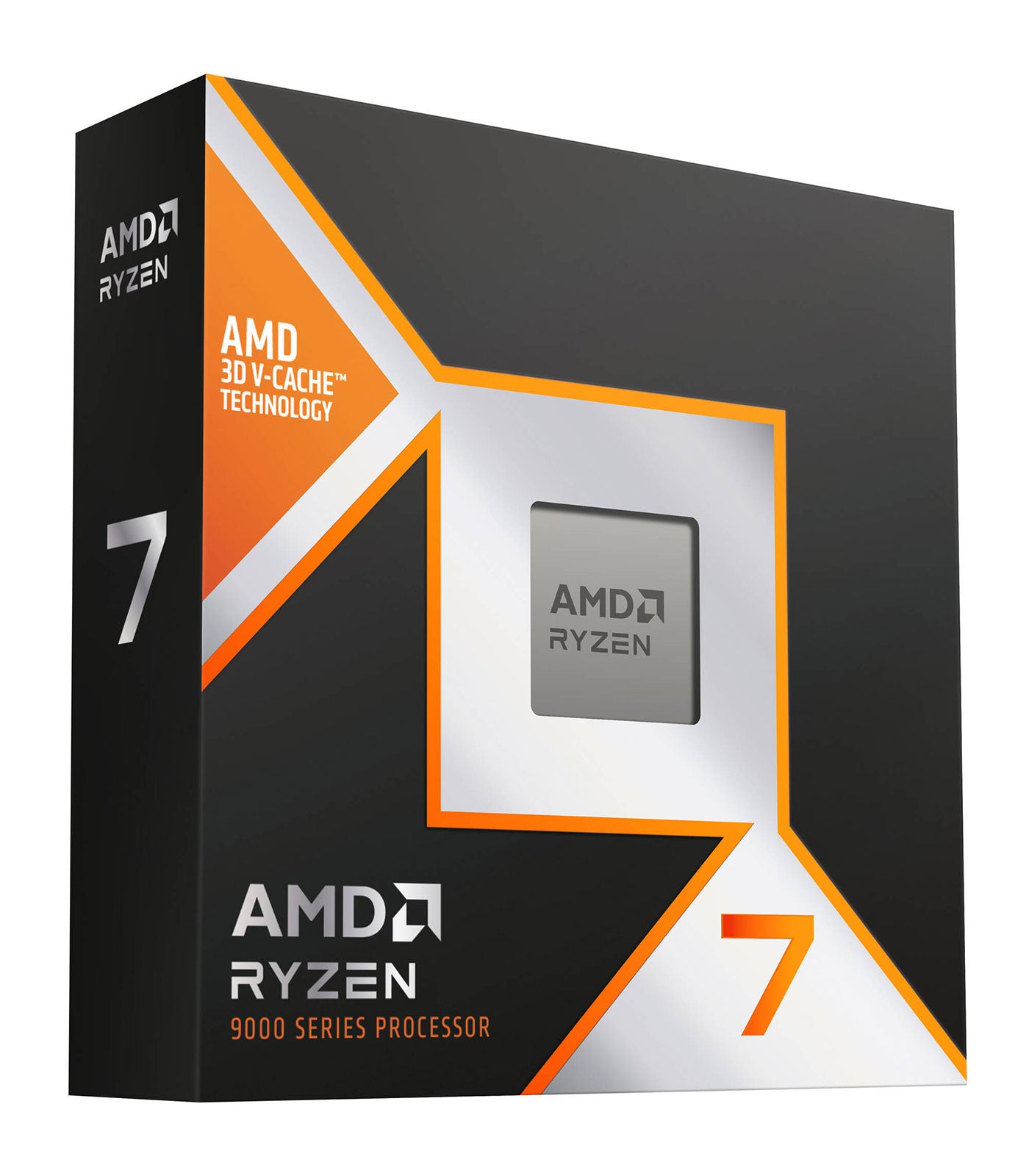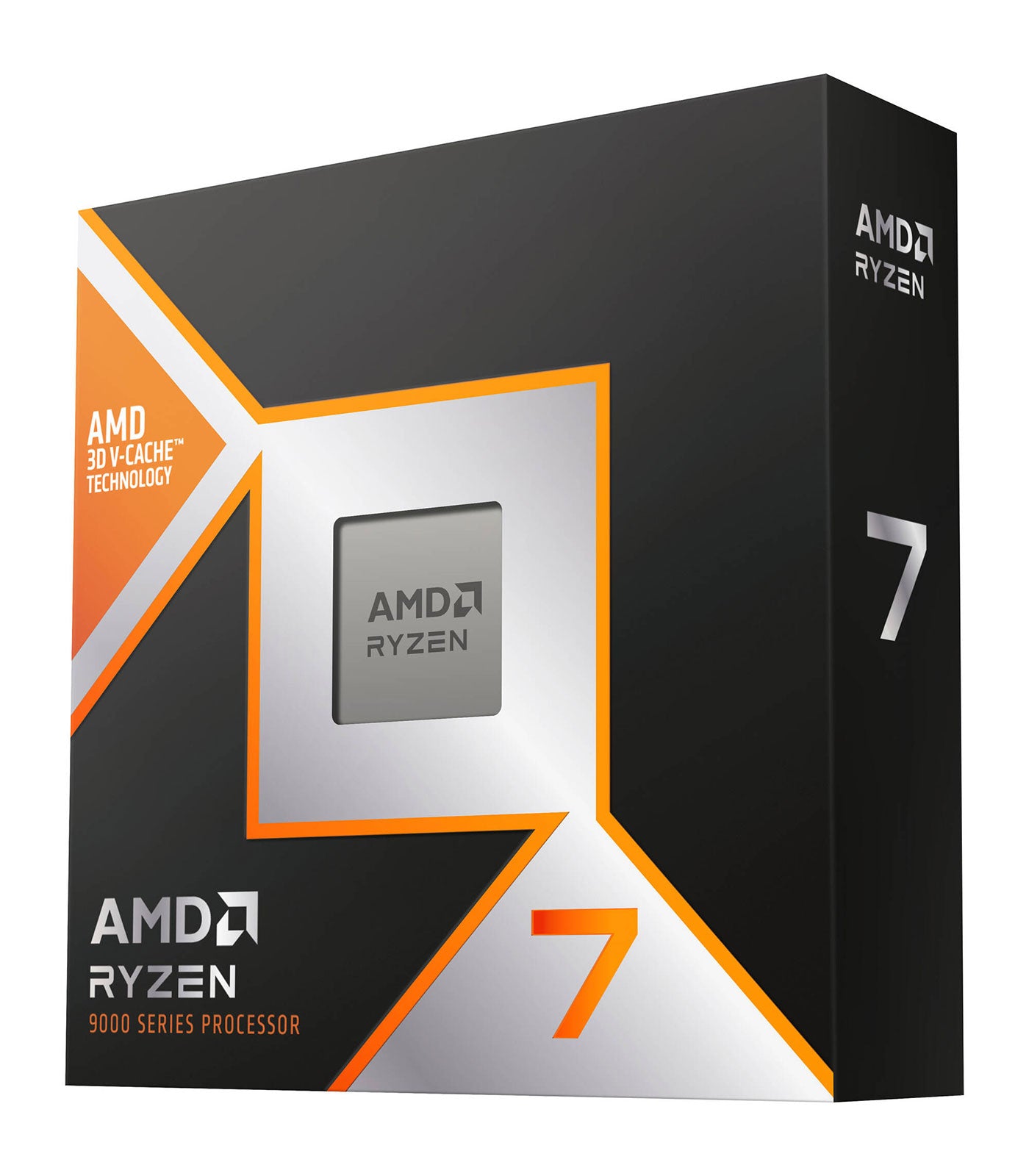AMD Ryzen 7 9800X3D 4.7 GHz Eight-Core AM5 Processor
General Specifications:
Name AMD Ryzen™ 7 9800X3D
Family Ryzen
Series Ryzen 9000 Series
Form Factor Desktops , Boxed Processor
Market Segment Enthusiast Desktop
AMD PRO Technologies No
Consumer Use Yes
Regional Availability Global
Former Codename Granite Ridge AM5
Architecture Zen 5
# of CPU Cores 8
Multithreading (SMT) Yes
# of Threads 16
Max. Boost Clock Up to 5.2 GHz
Base Clock 4.7 GHz
L1 Cache 640 KB
L2 Cache 8 MB
L3 Cache 96 MB
Default TDP 120W
Processor Technology for CPU Cores TSMC 4nm FinFET
Processor Technology for I/O Die TSMC 6nm FinFET
Package Die Count 2
Unlocked for Overclocking Yes
AMD EXPO™ Memory Overclocking Technology Yes
Precision Boost Overdrive Yes
Curve Optimizer Voltage Offsets Yes
AMD Ryzen™ Master Support Yes
CPU Socket AM5
Supporting Chipsets A620 , X670E , X670 , B650E , B650 , X870E , X870 , B840 , B850
CPU Boost Technology Precision Boost 2
Instruction Set x86-64
Supported Extensions AES , AMD-V , AVX , AVX2 , AVX512 , FMA3 , MMX-plus , SHA , SSE , SSE2 , SSE3 , SSE4.1 , SSE4.2 , SSE4A , SSSE3 , x86-64
Thermal Solution (PIB) Not Included
Recommended Cooler Liquid cooler recommended for optimal performance
Max. Operating Temperature (Tjmax) 95°C
Launch Date 11/07/2024
*OS Support Windows 11 - 64-Bit Edition , Windows 10 - 64-Bit Edition , RHEL x86 64-Bit , Ubuntu x86 64-Bit
Features
The AMD Ryzen 7 9800X3D, clocked at 4.7 GHz, represents a significant leap in performance and efficiency, targeting gamers, content creators, and professionals. Built on the innovative Zen 4 architecture, it leverages AMD’s 3D V-Cache technology to boost processing power, opening new possibilities for high-end computing. With eight cores and 16 threads, the 9800X3D promises a blend of speed and efficiency that makes it one of the most anticipated entries in AMD’s Ryzen lineup. we’ll dive deep into the architecture, performance benchmarks, and applications of the Ryzen 7 9800X3D, revealing why it’s a game-changer in modern computing.
Zen 4 Architecture and AM5 Socket
The Ryzen 7 9800X3D is based on AMD’s Zen 4 architecture, which utilizes a 5nm process node. This advanced fabrication process offers increased power efficiency and allows for higher performance without a corresponding increase in power consumption. One of the most important shifts in the Zen 4 architecture is the move to the AM5 socket, which brings DDR5 memory and PCIe 5.0 support. For those upgrading from AM4-based systems, the AM5 socket may require new motherboards, but the benefits of faster memory and PCIe 5.0 lanes justify the transition for high-performance users. The shift to DDR5 memory is especially important, as it enables higher bandwidth and improved power efficiency, which contributes to the overall performance gains of the Ryzen 7 9800X3D. Additionally, PCIe 5.0 support doubles the data transfer rates over PCIe 4.0, making the processor highly suitable for high-performance graphics cards and storage devices.
3D V-Cache Technology: Boosting Gaming Performance
The standout feature of the Ryzen 7 9800X3D is AMD’s 3D V-Cache technology. This technology allows AMD to stack an additional layer of cache on top of the CPU, providing faster access to data. The Ryzen 7 9800X3D includes a massive 96MB L3 cache, which is a significant boost over typical processors in its class. For gamers, this means reduced latency, smoother frame rates, and improved performance in titles that rely heavily on cache memory. The 3D V-Cache feature sets the Ryzen 7 9800X3D apart, especially in gaming. Many modern games benefit from the large cache because it reduces the need to access slower main memory. With 3D V-Cache, the 9800X3D minimizes bottlenecks, creating a fluid gaming experience. This is particularly valuable for competitive gamers who require the highest frame rates possible.
Eight Cores and 16 Threads for Multitasking
The Ryzen 7 9800X3D features eight cores and 16 threads, making it well-suited for multitasking and demanding workloads. While gaming often doesn’t require as many threads, content creators working with video editing, 3D rendering, and other CPU-intensive tasks will find this configuration ideal. The 4.7 GHz boost clock ensures that the 9800X3D can handle single-threaded and multi-threaded applications efficiently, providing versatility for a range of tasks. Multi-threaded workloads, such as rendering videos or running virtual machines, benefit from the additional threads. The processor can manage multiple tasks without slowdown, enabling users to game, stream, and edit simultaneously without compromising performance.
Power Efficiency and Thermal Management
With a 5nm process and AMD’s advancements in power efficiency, the Ryzen 7 9800X3D strikes a balance between performance and energy consumption. Despite its high clock speed, it is designed to stay within a reasonable power envelope, thanks to AMD’s Precision Boost and power management features. This efficiency is crucial for users building small form factor PCs or those looking to save on electricity without compromising performance. Thermal management is another area where the Ryzen 7 9800X3D excels. Its efficient design minimizes heat output, but users with high workloads or gaming setups may still benefit from pairing it with a quality cooling solution. For overclocking enthusiasts, keeping the processor cool allows it to maintain high speeds over extended periods, ensuring sustained performance.
DDR5 Memory and PCIe 5.0 Support: A Future-Proofed System
The Ryzen 7 9800X3D’s support for DDR5 memory and PCIe 5.0 adds to its appeal. DDR5 offers double the bandwidth of DDR4, making it an ideal match for the processor’s high-speed design. For gaming and memory-intensive applications, the increased memory bandwidth can lead to noticeable improvements in responsiveness and performance. PCIe 5.0, on the other hand, is essential for users who plan to upgrade their graphics cards and storage devices in the future. The increased bandwidth of PCIe 5.0 means faster data transfer rates for NVMe SSDs and other peripherals, enhancing the overall speed of the system. The inclusion of PCIe 5.0 ensures that the Ryzen 7 9800X3D remains relevant for years to come, making it a solid investment.
Overclocking Capabilities
While AMD’s processors come with advanced boost technologies that push performance close to their maximum potential, the Ryzen 7 9800X3D remains open to overclocking for enthusiasts. Precision Boost Overdrive (PBO) allows users to push their processor beyond its stock performance, though this requires effective cooling to manage the increased thermal output. For those who enjoy customizing their setup and squeezing every ounce of performance, the 9800X3D offers plenty of headroom to experiment. AMD’s Ryzen Master software simplifies the overclocking process, enabling users to monitor and tweak their CPU settings with ease. With proper cooling and adjustments, users can often achieve stable performance gains that enhance both gaming and productivity tasks.
Performance Benchmarks
Benchmarks showcase the Ryzen 7 9800X3D’s strengths across different scenarios, with gaming being one of its standout applications. Paired with a high-end GPU, the processor delivers frame rates that rival or exceed those of its competitors, thanks to its extensive cache and high clock speed. In games like Cyberpunk 2077, Call of Duty: Warzone, and Assassin’s Creed Valhalla, the Ryzen 7 9800X3D delivers smooth gameplay, even at high settings. In productivity benchmarks, the processor performs exceptionally well in applications like Adobe Premiere Pro, Blender, and DaVinci Resolve. The multi-threading capabilities of the 9800X3D reduce render times and improve workflow efficiency, making it a strong choice for content creators who rely on speed for video editing and 3D modeling tasks.






